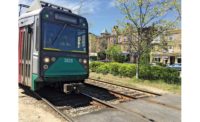Engineers are going back to the drawing board to offset the $800-million surge in the cost of a first-phase Dulles Corridor Rapid Transit commuter rail extension into Northern Virginia.
Dulles Transit Partners, a joint venture of Bechtel, San Francisco, and Washington Group International, Boise, released the preliminary engineering cost estimate on June 25. The estimated $1.5 billion for the first 11 miles of the 23-mile project is 60% over the original estimate, which was $1.45 billion for the full route.
Project partnersincluding Fairfax County, Va.; Loudoun County, Va.; Virginia Dept. of Transportation; Virginia Dept. of Rail and Public Transportation; Metropolitan Washington Airport Authority and the Washington Metropolitan Area Transit Authoritysay they cannot accept the new number.
"The number is too high for the cost effectiveness of the projects," says Sam Carnaggio, VDRPT project director. If the Federal Transit Administration downgrades the projects cost-effectiveness, that could eliminate its 50% share of federal funds, he says. "We are going to have to look for cuts down to the bare bones of the project."
State revenues, including road toll and a special real estate tax, would fund the other 50%.
A tunnel through Tysons Corner, Va., is the prime target of redesign. Laying rail through this area above ground will save about $132 million, say the partners. Eliminating pedestrian bridges will cut another $100 million, they say.
With these cost-cutting recommendations in hand, the joint venture expects to have an alternate plan ready by the end of August, Carnaggio says. "We are fortunate the cost increase happened so early," says Dulles Transit Partners Executive Director Roger Picard. "If this had happened later, the project would be dead."
But the spiraling cost has given opponents a new reason to speak up. "Its unconscionable for Virgi-nia to go forward with this project," says William Vincent, general counsel for Breakthrough Technologies Institute, Washington, D.C., which favors a bus rapid transit system instead.
A large part of the infrastructure needed for the bus system already is in place in the form of an airport access dedicated highway that runs from Tysons Corner, says Vincent. "A [bus] system would meet the demand and cost a fraction as much," he adds.


Post a comment to this article
Report Abusive Comment